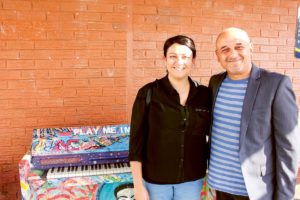Prior to emigrating to Australia in 2015, Tadros Hanna was a successful architect and interior designer in Egypt. However, despite his skills and experience, he found it difficult to gain employment in his chosen field, a common theme for many newly arrived Australians.
“People who are born here can find it a challenge to find work, so what about people who come from another country? They don’t speak the same language, so it is impossible for them to have the same opportunity to find work.”
Because of a lack of local qualifications, Tadros found the process of looking for work discouraging. “I remember the first day I went to another organisation and I told them I need to be an architect again and they said ‘Impossible!’. So maybe I can’t be an architect here and I can’t build homes or buildings, but I can build myself and build my children and contribute to the community.”
He began volunteering at the community hub at his son’s school. It was here that he was put in touch with Nicole Attard (pictured), a Settlement Support Worker with Jesuit Social Services. Tadros says that Nicole “was the one who searched to find help for me. She helped me with my first steps and supported me.”
In addition to his volunteer work, Tadros has been making connections in his new community through art, through his participation in Jesuit Social Services’ Diversity Through the Lens project in 2016, the Play Me, I’m Yours street pianos project, and his first solo art exhibition in mid–2018.
Despite the challenges he has faced during his time in Australia, Tadros says he is very happy in his new home.
“Here in St Albans, it is like the UN, you see different people but at the end we are all the same, we have the same needs, we have the same dreams and we share all the same values – humanity.”
Tadros says the settlement services provided by Jesuit Social Services are vital in ensuring a smooth transition for migrants to life in their new community.
“They support you when you don’t have a family and don’t have friends. They care about you and want the good for you and your children and try and open doors for you so you can contribute to the community. While I’m not working, I’m trying to volunteer everywhere to feel that I’m still alive and that I have a value. Everyone needs to contribute to feel like they belong to the community.”







